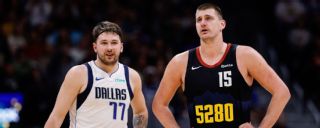|
It's that time of year! I didn't have a ballot this season, but this is how I would have voted on the NBA's individual honors. Stay tuned for the All-NBA, All-Rookie and All-Defensive teams Friday.
MOST VALUABLE PLAYER
1. Nikola Jokic, Denver Nuggets 2. Luka Doncic, Dallas Mavericks 3. Shai Gilgeous-Alexander, Oklahoma City Thunder 4. Giannis Antetokounmpo, Milwaukee Bucks 5. Jalen Brunson, New York Knicks Gilgeous-Alexander and especially Doncic made this a real debate, even if Jokic will likely end up winning his third trophy. Their relative voting totals (presumably for No. 2) should be close. The advanced numbers are split between them, although they might lean slightly toward Gilgeous-Alexander. He's a much better defender than Doncic. He shot a higher percentage, but the gap shrinks toward zero when you account for how many more 3s Doncic attempted; they hit 2s at an almost identical rate. Gilgeous-Alexander had the stronger start. He finished a bit slowly while dealing with a leg injury. Doncic has been an inferno for two-plus months as the Mavericks surged up the standings. The Thunder were near the very top from wire to wire. It is impossible to imagine a team so young being this good without a veteran superstar to steady it -- to seize the offense when the game gets frenzied and create a good shot from scratch. Gilgeous-Alexander is ungraspable, a pivoting phantom. He leveled up as a playmaker. He imbued this young team with a calm swagger in hothouse moments: We have him, so we are good. The Thunder outscored opponents by 11.3 points per 100 possessions with Gilgeous-Alexander on the floor and were about dead-even -- minus-5 total points! -- when he sat. In a lot of seasons, Gilgeous-Alexander would win this. That he comes third here -- that Antetokounmpo comes fourth while averaging 30.5 points, 11.5 rebounds, and 6.5 assists on 61% shooting -- is a testament to the historic greatness atop the league. What gives Doncic the thinnest of edges for No. 2 is his combination of size and playmaking. He dished 9.8 dimes, compared with 6.2 for Gilgeous-Alexander. Doncic's ball-dominant style contributed to that difference, but it's not as if Gilgeous-Alexander plays like Stephen Curry. Doncic can make more passes from more places and envisions reads almost no one else imagines. It makes him unpredictable, more dangerous, scarier. Whether that should trump Gilgeous-Alexander's advantages in defense and turnover avoidance -- he coughed it up only twice per game, half Doncic's rate -- is up to each voter. Here, it does. Doncic did enough that he, the Mavericks and their fans are owed a real, logical explanation for why Jokic should win. It can't be, Well, everyone agrees Jokic is the best player. (Most do, but still.) It can't stop at, Well, Denver finished second in the West and the Mavs finished fifth. The Nuggets finished seven games ahead of Dallas. They have a fatter point differential: plus-5.3 per game, compared with plus-2.3 for the Mavs. Jokic is the best player on the No. 2 seed. That matters, but it is not dispositive. It can't be just, Well, Jokic is more fun to play with because he doesn't hold the ball. That's true too, and there is something catalytic and hard to capture in numbers about the power of Jokic's pass-receive-pass again style. There is magic in it. It molds a culture. It motivates teammates to play harder. It keeps defenses guessing. The advanced numbers that scream for Jokic every season are finding something in there. But where's the fun in pointing to a pile of jargony numbers and saying, "Case closed!"? Doncic does lead in at least one well-respected catch-all stat: estimated plus-minus. Doncic led the league in scoring. He loosened his grip on the ball to adapt to Kyrie Irving. He tossed some of the league's snazziest hit-aheads -- some almost Jokic-ian -- and sped up his pace. He edged Jokic in assists. He hit 57% on 2s and 38% on 3s. The Mavs were plus-5.8 points per 100 possessions with Doncic on the floor and minus-4.3 when he sat -- a sizable difference. The Nuggets were even better with Jokic on the floor: plus-11.8. They were an ugly minus-8.6 when he sat, although Denver's chill mode regular-season rotations -- bench mobs -- distort how bad the non-Jokic minutes really are. The incredible thing about Jokic's splits every season is that the Nuggets are so good with him -- with such a massive positive margin -- you don't really need to take into account their cratering during his rest periods. You can make an airtight case for Jokic without addressing the weak spots on the Nuggets roster. So what else are those advanced numbers capturing? How else is Jokic actually, provably, the best? I suspect a lot of it comes down to the two players having something like equal basketball skill and genius, with one being much larger and taller than the other. That sounds dumb, but Jokic's size gives him easier access to the most profitable real estate -- the paint and the rim. He can arrive there with the ball in different ways and work from different angles that open up more passes and cuts. It makes the Denver offense more diverse. It's also why Jokic is a more efficient scorer. Jokic hit 62.6% on 2s. That's preposterous for someone who rarely dunks. Antetokounmpo, who dunks a lot, shot 64.5% on 2s. (Antetokounmpo was fantastic. His on-ball defense wasn't quite the same, and the Bucks never really found themselves. That's not Antetokounmpo's fault, although his reported sign-off on the hiring of since-deposed head coach Adrian Griffin contributed to the team's chaotic season. In fairness, others within the organization endorsed Griffin too. Injuries and roster churn undid all the Bucks' attempts to catch a rhythm.) Jokic's size also makes him a better defender than Doncic almost by default. The gap is not small. Jokic has become a pretty solid defender. He reads opposing offenses as well as you'd expect given how well he reads opposing defenses. He's in the right spaces at the right times, and he takes up a ton of that space. He piles up steals and deflections. And then there is the rebounding. Jokic might be the league's best defensive rebounder. He has magnet hands. He gets a ton of contested rebounds, and if the man he outfights for those boards is your center, you are in for a world of pain. Jokic snatching the ball and turning up court as your center flails behind him is maybe the most terrifying sight in the sport -- death by 5-on-4. Jokic's best strengths on defense bleed right into Denver's offense. The advanced metrics must be seeing that. It's close -- closer than the straw polls and Vegas odds -- but Jokic is the MVP again. He is the best player in the world, and there was not much difference this season between being the best and being most valuable. I had Jayson Tatum penciled in fifth for much of the season -- a nod to his individual brilliance and the Celtics' rampaging campaign. (Kawhi Leonard, Kevin Durant, and Anthony Davis hovered nearby too at times.) Factoring in size and defense, he is a better player than Brunson. Given the choice of one to build a team around, I'd take Tatum. But Brunson had at least as good of a season, even factoring in Tatum's advantage on defense. Brunson scored more, recorded more assists and shot better on 3s. Most of the advanced stats -- which factor in defense -- give Brunson a teensy edge. In the case of something like a tie, I give a little more weight to that amorphous word "valuable." Tatum is the best player on a team that mostly stayed healthy and is loaded with top-50 guys. Brunson carried the Knicks through injuries to several key players, including their second offensive engine -- Julius Randle. With Randle gone, what other players do you trust to create high-volume offense? The Knicks find ways -- Josh Hart roaring in transition, Donte DiVincenzo flying around screens, Isaiah Hartenstein's buttery floater -- but it all flows from Brunson solving every defense. The Knicks outscored opponents by 8.6 points per 100 possessions with Brunson on the floor -- and were minus-4.8 when he sat. They obliterated teams when Brunson played without Randle. He gets the nod and has a real shot at cracking first-team All-NBA. What a season.
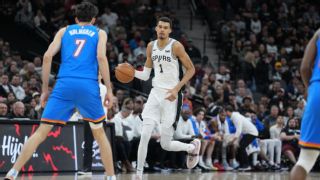 ROOKIE OF THE YEAR1. Victor Wembanyama, San Antonio Spurs 2. Chet Holmgren, Oklahoma City Thunder 3. Brandon Miller, Charlotte Hornets Wembanyama is on his own level. His edge on Holmgren in counting stats might shrink if you put them on equivalent rosters, though I suspect he would maintain his lead in assists; Wembanyama is a very good passer. But Holmgren's edges in shooting efficiency and turnover rate would shrink too, and the net effect would be Wembanyama looking superior. The notion of stakes -- of Wembanyama's games having little consequence because his team is bad -- matters less for me in considering rookie awards, since the lottery consigns the best rookies to the worst teams. Miller passed Holmgren in scoring over the last 20-plus games, but Holmgren is ahead everywhere else; his two-way work on an elite team is enough for him to coast into No. 2. Once Jaime Jaquez Jr.'s minutes and production dropped -- he's down to 32% on 3s -- there was no major competition for Miller at No. 3. Advanced numbers don't love Miller, but they don't love any rookie who played real minutes in a consistent rotation role. The closest to an exception is Dereck Lively II, but injuries and the introduction of Daniel Gafford depressed his playing time; Miller logged 1,100 more minutes than Lively. Amen Thompson and Brandin Podziemski have solid numbers, but what Miller managed as the sometimes No. 1 option on a terrible team trumps everyone. It took 25 games for Thompson to bust the crowded Houston Rockets rotation. Podziemski has veteran talent all around him, and his shooting numbers are almost identical to Miller's. Miller scoring 17 points on even decent efficiency -- 50% on 2s, 37% on 3s -- is a borderline miracle given the injuries and overall talent dearth in Charlotte. Miller looks like a future two-way star.
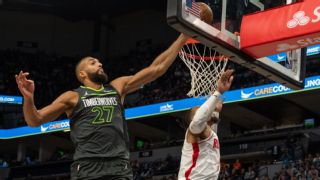 DEFENSIVE PLAYER OF THE YEAR1. Rudy Gobert, Minnesota Timberwolves 2. Victor Wembanyama, San Antonio Spurs 3. Anthony Davis, Los Angeles Lakers For my money, the four best defenders in the league were these three and Bam Adebayo. With the new positionless ballot, all four will appear on my All-Defensive first team. It is hard for smaller guards and wings to have the same all-encompassing impact on defense as bigs this skilled. Right behind them, though, comes a cadre of incredible guards and wings: Derrick White, Herbert Jones, Alex Caruso, Jaden McDaniels, Kentavious Caldwell-Pope, Kawhi Leonard and Jalen Suggs. One of them will get my final All-Defensive first-team spot. Some others will appear on my second team. At least four other bigs merited a close look: Antetokounmpo, Aaron Gordon, Isaiah Hartenstein and especially Brook Lopez, who became a shot-blocking menace again the second Milwaukee shifted him back into the paint. Lopez is the best Bucks candidate. The Bucks allowed 111.9 points per 100 possessions with Lopez on the court and a hideous 116.6 when he sat. Milwaukee's defense wilted when Antetokounmpo played without Lopez and held steady in the opposite scenarios, per Cleaning The Glass data. Fluky opponent 3-point shooting drove some of that, but Antetokounmpo wasn't quite as impenetrable this season. Lopez was able to douse only so many of the fires that ignited on the perimeter. Gobert is a better version of Lopez -- the (mostly) paint-bound rim-protector. Davis is elite there too, with more speed and schematic versatility. He was outstanding all season -- fearsome, propping up average and below-average defenders all around him. Dig deep enough and you can find some wobble in every player's case -- every player but Gobert. The Lakers' defense performed at the same level with Davis on the bench. Opponents shot about as expected -- based on shot distance and the identity of shooters -- when Davis was the closest defender, per Second Spectrum research. The other main candidates depressed that expected percentage by a lot. Do those numbers really mean anything? It's hard to say, but in Davis' case, some combination of randomness and roster context probably explains a lot of them. Wembanyama is a different player now than he was in November and December -- as you'd expect. He logged 500 fewer minutes than Gobert and 600 fewer than Davis. A few post-up brutes -- notably Alperen Sengun -- bullied him. Adebayo -- my pick two years ago, when Marcus Smart won -- is 6-foot-9 without crazy verticality or length; opponents shot 59% at the rim against him compared with about 52% against Gobert and Wembanyama and 54% against Davis. Adebayo averages one block per game. Opponents don't U-turn when they spy Adebayo near the rim the way they recoil at the sight of these other three. The trade-off, of course, is that Adebayo is the switchiest among them, capable of keeping just about any ball handler in front of him. (The Heat had Adebayo switch less often this season to keep him closer to the basket.) Miami can play any style with Adebayo. That flexibility is invaluable in the postseason. Opponents tried Adebayo in isolation more than 150 times and produced a paltry 0.888 points per possession, according to Second Spectrum data. They went at Gobert even more -- 200-plus times -- and did even worse: a laughable 0.811 points per possession. Gobert is not as fast or coordinated as Adebayo; teams with elite pull-up shooters can drag Gobert outside his comfort zone. But that effect has always been overstated. Gobert is nimbler than you might think. The numbers and the eye test scream that he does fine out there -- at least over an 82-game sample. There is no weak spot in Gobert's dossier. He is the best defensive player on by far the best defensive team. He has already won this award three times, and this might be his best defensive season. The beefed-up support around him helps -- including McDaniels and Anthony Edwards. He never had such rangy, mean perimeter tag team partners in Utah. Gobert doesn't have to plug as many holes or scramble back and forth as often. Make his job 10% easier and he is an absolute force field. Wembanyama's radius of pain extends further and will eventually blot out damn near the entire court. There are a handful of players who alter the spatial geometry of the game. They warp the sport. Wembanyama is one but has very little support around him now. Even in that environment, the Spurs allowed 111 points per 100 possessions with Wembanyama on the floor -- equivalent to a top-five defense. That number ballooned to 117.3 when he rested. He has a case to win this thing. He should make an All-Defensive team -- ultrarare for a rookie. The big award feels premature. Wembanyama went through his version of rookie growing pains before finding his footing. The Spurs' bad record and overall defense factor in, but maybe not for the reasons you'd think. This is an individual award, and San Antonio's defense was solid when Wembanyama played. But there were no stakes -- no pressure -- in any of Wembanyama's games. The Wolves, meanwhile, were contenders. Gobert and his team faced intense scrutiny after an uneven first season together. To his credit, Wembanyama never played as if his games were meaningless. He played to win, played the right way. He stared down his own kind of spotlight: global expectations. But for awards this prestigious, stakes at the team level should matter.
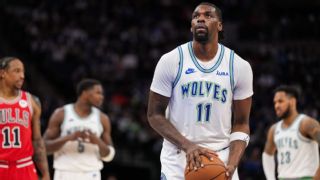 SIXTH MAN OF THE YEAR1. Naz Reid, Minnesota Timberwolves 2. Malik Monk, Sacramento Kings 3. Bogdan Bogdanovic, Atlanta Hawks The toughest omissions were Bobby Portis and Norman Powell. Portis finished strong, bumping his average to 13.8 points -- about even with Reid and Powell -- and nudging close to 50/40/80 shooting splits. His spot-up shooting and old-school midpost scoring were among the only reliable subsets of the Bucks' offense during the team's late swoon. Portis isn't a great defender, but he grinds; he can blitz and switch in a pinch; and he battles on the glass. Portis started slowly, but he cobbled a strong case. I wouldn't quibble with him winning. Powell did his main job in raining fire from deep for the LA Clippers, hitting 43.5% on 3s. His north-south speed is an essential change of pace on a team of deliberate scorers. He is the fifth cog in what might be LA's best lineup, and a keystone of its center-less super-small groups. But there were lots of nights when Powell's impact felt muted around Paul George, Kawhi Leonard and James Harden. He attempted 13.9 shots per 36 minutes, down from 16.3 last season. His free throw rate fell off a cliff. If Powell isn't scoring, he's not doing much else to push winning -- even if he has value standing around as a spot-up threat. If this were Sixth Man of the Last Two Months, T.J. McConnell might have won. He tapped into a scoring gear no one knew he had. He changed games off the bench and can play heavy minutes alongside Tyrese Haliburton. But he opened the season on the fringes of Indiana's rotation and lags between 581 and 1,110 minutes behind the main candidates. That's too many. The last truly tough omission was Caris LeVert, who leveled up his passing and functioned as something of a chameleon for a Cleveland team that seemed to be missing someone every night. But 42% shooting -- 32.5% on 3s, 48.6% on 2s -- wasn't good enough. (Tim Hardaway Jr. also spent much of the season in a shooting funk.) For most of the season, I had Monk in the lead. His supplementary playmaking -- 5.1 assists, far ahead of Reid and Bogdanovic -- was the single most important discrete skill among this group. The Kings are starved for off-the-bounce playmaking beyond De'Aaron Fox. Monk supplied it, helping the offense tread water when Fox rested and bringing his usual bursts of game-tilting buckets. His knee injury was a death blow for Sacramento's hopes of finishing above the play-in. But Monk slumped just before that injury, finishing at 44% overall and 35% on 3s. Reid brings more on defense if only due to his size and rebounding. And what a season for Reid -- what a finishing kick filling in for Karl-Anthony Towns. In the games Towns missed with a meniscus injury, Reid averaged 19 points on 48% shooting -- including 44% on 3s. He provided near Towns-level spacing for Edwards and Gobert. Reid can score in almost any manner and finishes with both hands. He's a snappy passer. The Wolves went 12-6 without Towns, hanging in the race for No. 1 seed until the bitter end. Some voters argue that rewarding Bogdanovic and Reid for their contributions as replacement starters cuts against the idea of an award intended for reserves. (I wrote extensively about Bogdanovic's case here.) I have always rejected that, dating to Lamar Odom's heyday. The ability to shape-shift -- to take on whatever role the team needs -- is baked into the concept of a sixth man, or "sixth starter." Players are eligible as long as they come off the bench in more games than they start. (Josh Hart is barely ineligible for this reason.) Both Reid and Bogdanovic should get some first-place votes.
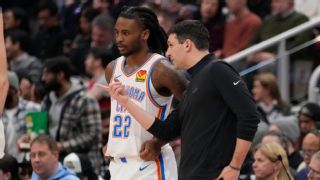 COACH OF THE YEAR1. Mark Daigneault, Oklahoma City Thunder 2. Jamahl Mosley, Orlando Magic 3. Joe Mazzulla, Boston Celtics This was a wrenching debate between two young coaches whose even younger teams shattered expectations -- with Mazzulla and Chris Finch right behind them. (Finch was a brutal unofficial No. 4. All four are deserving of the top spot.) The Magic finished a remarkable third in points allowed per possession. Mosley and his staff persuaded a group of young players to buy all the way into the dirty work. The Magic are a battering ram. They are ultraphysical and don't mind if you get to the line a lot because they'll get there even more. They own the glass. They are huge and switchable, with zero letup. That defense has to carry the day; Orlando ranks 22nd in points per possession, marking the 12th straight season in which the Magic have ranked 20th or worse in offense. The Thunder finished in the top four on both ends. Oklahoma City brings more tactical variety, but that is partly the result of pure talent. The Thunder overflow with shooting around an MVP candidate; the Magic are bereft of shooting and will likely have zero players on the All-NBA teams. Oklahoma City's deeper tool kit allowed Daigneault to try unconventional things -- tactics we notice because they are strange, and they mostly work. But someone had to think, "Hey, what if we built half our offense around weird guard-guard screens?" Then actually try it and figure out what worked and what didn't. Daigneault was also among the quickest with the counter to your counter. If you adjusted the defensive matchups, the Thunder downloaded it on the very first possession -- and pivoted to exploit it. It was ruthless. Daigneault also understood how to use the Thunder's strengths on defense -- the swiping hands and tireless speed of youth -- to compensate for what they lack in size and rebounding. The Magic are a good team. The Thunder are a very good one. Mosley and Daigneault are deserving. I suspect voters will agonize over this. Daigneault barely gets the nod here. Mazzulla snags the last spot over a host of candidates: Finch, of course; Ime Udoka imposing a standard of defense and solving his roster again after Sengun's injury; Michael Malone's steady hand in Denver; Rick Carlisle reorienting everything about Haliburton; Tom Thibodeau searching for perfection on both ends; Tyronn Lue, the endless tinkerer; Erik Spoelstra's MacGyver-level adaptability; and several others. But Mazzulla deserves recognition for Boston's utter dominance. The front office remade the roster around Tatum and Jaylen Brown, but it did so aiming at Mazzulla's vision of shooting and defensive versatility. Mazzulla can come off as didactic, eschewing timeouts during opponent runs and pushing Boston to launch even more 3s: Oh, you think 45 3s was too many? Watch us take 55. There is a method to all of it. It will be a surprise if you catch Boston without a timeout when it needs one late. Mazzulla is right about the shot attempt math, although the ultimate test will be how he and the Celtics respond in May and (maybe) June when the 3s go cold. The Celtics pulled their restricted area attempts up into a more normal range -- below-average, but normal below-average -- after a midseason dip into alarming territory. What happens in the highest-leverage games? Do the Celtics plow to the rim or go down in a hail of 3s -- determined to prove their way is the way and ready to blame the vicissitudes of "a make-or-miss league" if they fail? But there is no denying what Mazzulla has helped build. Boston might be the league's most creative and unpredictable defensive team. It adjusts ahead of offenses. It forces you to react. It anticipates your counter and rearranges the board again.
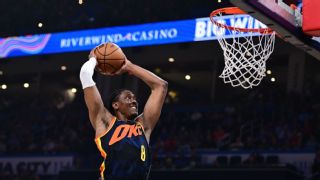 MOST IMPROVED PLAYER1. Jalen Williams, Oklahoma City Thunder 2. Coby White, Chicago Bulls 3. Tyrese Maxey, Philadelphia 76ers This is a deeper and murkier pool than usual, without one blow-away candidate -- typically someone in his third or fourth season. That would have been Hawks forward Jalen Johnson, who checked every box: opportunity, raw production, efficiency and massive leaps in one or two swing skills -- including 3-point shooting. Alas, Johnson did not meet the 65-game threshold. Requiring that many games feels slightly counter to the spirit of this award. I'd be fine lowering it to 50 games. (The 65-game rule does not apply to Sixth Man of the Year.) Jonathan Kuminga and Sengun come closest to the archetypal winner, and both were on my short list. They were not simply cases of maintaining production over larger minutes -- which is by itself a form of improvement. (Isaiah Hartenstein approximates that candidate type, although he reached new heights on defense. He should make some ballots. Cam Thomas fits this genre too. He could always score like gangbusters; he just got to do it more amid the rubble of the Kevin Durant/James Harden/Kyrie Irving Nets. That said, anyone who doubled his scoring average -- from 10.6 points to 22.5 for Thomas -- deserves real attention here, and Thomas progressed as a passer over the last half of the season. He almost cracked this ballot. I'd just like to see how his game translates to a better roster.) Some reserves and younger starters wither when teams ask more of them. Kuminga and Sengun became hubs, holding up against increased attention from defenses. Both improved on defense. Kuminga honed his overall feel and passing. Both guys dropped off a bit from deep, but each would be a worthy winner. Cade Cunningham made some version of the Year 3 leap, hitting 45% overall and 35.5% on 3s -- both career highs. But those aren't eye-popping numbers, and most of Cunningham's jump came long after Detroit's season was effectively over. (Jalen Green's Year 3 leap came too late.) Jalen Brunson went from never having made an All-Star team to a possible first-team All-NBA appearance. Anthony Edwards rounded out his game, ascending toward superstardom. Gilgeous-Alexander was already there but took that final step toward the top of the MVP conversation. Peyton Watson heads the category of candidates who went from basically not playing at all to holding down meaningful roles. I always struggle with that group. Those players are almost more like rookies. Derrick White has always been good at lots of skills, but they have never sung in unison like this. Duncan Robinson remade his game in becoming an off-the-bounce threat. (Corey Kispert began the same transformation and almost doubled his assist rate. Grayson Allen belongs in this conversation too.) Herbert Jones and Jalen Suggs changed the entire trajectory of their careers by developing into dangerous 3-point shooters. Suggs was perhaps my toughest cut, along with Deni Avdija -- who improved across the board and seemed to shake his occasional 3-point jitters. Avdija averaged almost 15 points -- up from 9.2 last season. This was more than grabbing available numbers on a terrible team. Suggs shot 21% on 3s as a rookie and 32% last season. To even sniff 40% on higher volume is monumental. Suggs is so good at everything else that improving this one skill means more for him than for the typical player. (3-point shooting is notoriously fickle; Suggs needs to show this is real over multiple seasons. I wouldn't bet against him.) On some level, I understand why voters are reluctant to honor second-year players. Rookies are overwhelmed. By Year 2, they understand the NBA -- the rhythms, the competition level, the demands. They should enjoy one of their biggest year-to-year jumps. But why do third-year players so often win? Shouldn't growth continue and even accelerate from Years 2 to 3? What Jalen Williams just did went far beyond the typical Year 2 jump. Holy smokes. He averaged almost 20 points and shot 42.7% on 3s -- up from 35% last season. He got better at literally everything. Williams emerged as a legit No. 2 option on a 57-win team that competed all season for the No. 1 seed. He shot 28-of-41 in the last five minutes of close games, using size and craft to pry space for pull-up jumpers. He defends every position; Williams will be in the All-Defensive conversation soon. If you had no prior knowledge and tuned in to a week of Thunder basketball, you would assume Williams was a 10-year veteran and multitime All-Star. I had a dozen different guys penciled into the last two spots, but defaulted to White and Maxey. White averaged 15.1 points and 4.8 assists in his second season, so ratcheting up to 19.1 points and 5.1 dimes doesn't look huge. But those old numbers never carried as much substance as White's game does now. Opponents then never worried about White. His playmaking was unsteady and collapsed against elite defenses. In stretches this season, White was neck and neck with DeMar DeRozan as Chicago's best player and engine of its preposterous (again) crunch-time offense. He took over games. Every week or two, he had some defense searching for answers: Umm, we can't stop ... Coby White? He is a huge reason Chicago didn't really miss Zach LaVine. He is steadier as a shooter, dribbler and decision-maker. White's defense suffered some, but he's a more complete player now. (Ditto for his backcourt mate Ayo Dosunmu, who came on late.) Is Maxey above this award? He was a candidate two seasons ago and averaged 20 points last season. He's in the All-NBA discussion! His shooting percentages dropped, and the Sixers fell apart without Embiid; opponents outscored Philly by 7.8 points per 100 possessions with Maxey on the floor during Embiid's two-month absence. But that was not on Maxey. Philly had injuries everywhere. Tobias Harris wilted for about three weeks. And even with that two-month trough, the Sixers finished plus-1.3 points per 100 possessions when Maxey played without Embiid. He averaged 26 points and nearly doubled his assists, proving himself a capable No. 2 and worthy All-Star who could carry the offense in stretches. He kept the Sixers humming in the wake of the Harden debacle -- and all the debacles that preceded it. If Philly extends the Embiid era another half a decade, it will be because of Maxey.
|

